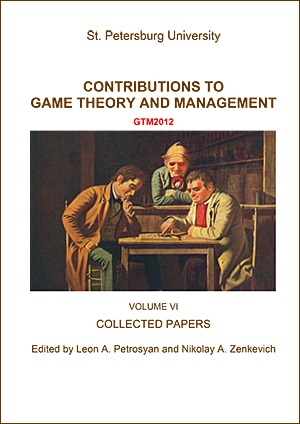The Strategy of Tax Control in Conditions of Possible Mistakes and Corruption of Inspectors
Abstract
A generalization of the game-theoretical model of tax control adjusted for possible corruption and inspectors mistakes is considered. The hierarchical model has a three-level structure: at the highest level of a hierarchy is an administration of tax authority, in the middle is an inspector, subordinated to tax administration, and at the lowest level are n taxpayers. It is supposed, that an interaction between risk-neutral players of different levels of a hierarchy corresponds to scheme “principal-to-agent”. The model is studied for the case when the penalty is proportional to the level of evasion. It is supposed that a tax inspector may turn out a bribetaker or make ineffective tax audit, i.e. make a mistake and don’t reveal an existing tax evasion. In the case of corruption a tax control supposed to be effective, i.e. reveals existing tax evasions always. As in previous models, it is supposed that fact of corruption is very difficult to reveal and an inspector is punished only for negligent audit. In the case of ineffective auditing it is assumed that the tax inspector can mistake and miss an existing evasion with the probability, which can be considered as a part of negligent inspectors of their total number. For every possible situation the players profit functions and optimal strategies are found.
Keywords:
tax auditing, tax evasion, corruption, ineffective auditing
Downloads
References
Boure, V. and Kumacheva, S. (2010). A game theory model of tax auditing using statistical information about taxpayers. St. Petersburg, “Vestnik SPbGU”, series 10, 4, 16–242 (in Russian).
Chander, P. and Wilde, L. L. (1998). A General Characterization of Optimal Income Tax Enfocement. Review of Economic Studies, 65, 165–183.
Chander, P. and Wilde, L. L. (1992). Corruption in tax administration. Journal of Public Economics, 49, 333–349.
Hindriks, J. and Keen, M. and Muthoo, A. (1999). Corruption, Extortion and Evasion. Journal of Public Economics 74, 3, 395–430.
Kumacheva, S. and Petrosyan, L. (2009) A game theoretical model of interaction between taxpayers and tax authority. St. Petersburg, ”Processes Of Conrtol And Stability: the 40-th International Scientific Conference Of Post-graduate And Graduate Students”, 634–637 (in Russian).
Vasin, A. and Morozov, V. (2005). The Game Theory and Models of Mathematical Economics. Moscow: MAKSpress (in Russian).
Vasin, A. and Panova E. (1999). Tax collection and corruption in Fiscal Bodies. Final Report on Consorcium of economic research and education (EERC).
Downloads
Published
How to Cite
Issue
Section
License
Articles of "Contributions to Game Theory and Management" are open access distributed under the terms of the License Agreement with Saint Petersburg State University, which permits to the authors unrestricted distribution and self-archiving free of charge.




